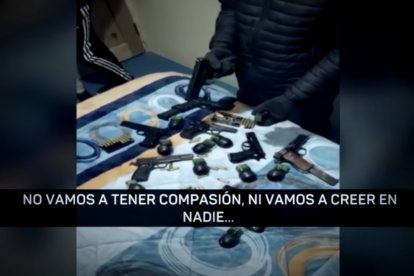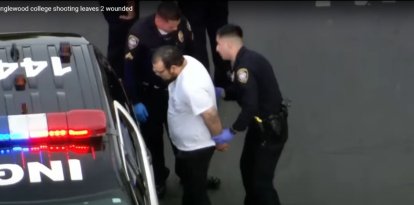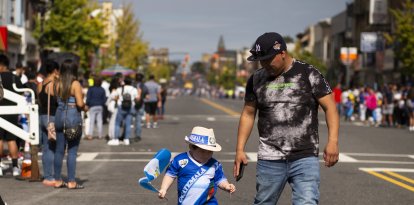Tren de Aragua criminal organization has arrived in Florida
Venezuelan gang members crossed the border using false identities.

Image of a police operation against the Tren de Aragua in Chile / Chilevisión.
At least two members of the Venezuelan criminal organization Tren de Aragua have crossed the border and settled in Orlando, Florida. According to El American, citing an anonymous source, at least two members of the criminal gang traveled from Colombia to Mexico's northern border and managed to enter the United States by using fake identities.
Last August, FBI Director Christopher Wray warned of the possibility of terrorist organizations taking advantage of President Biden's open borders policy. Tren de Aragua is not a terrorist organization per se, but it is a powerful criminal gang with more than 5,000 members.
The source provided the names and showed photos to El American of the criminals on U.S. soil. Per the report, the members of this criminal organization currently reside in Orlando, Florida, and one of them also managed to acquire a vehicle with fake identification. The criminals had been living outside Venezuela for a couple of years. They were living and operating the organization out of Bogota, Colombia."They made a lot of money, and, trying to escape the gang war, they changed their identity by bribing Venezuelan officials to obtain passports under other names."
The history of the Tren de Aragua
The Tren de Aragua is a Venezuelan criminal organization comprised of at least 5,000 members. In June, security agents arrested 17 of its members in Chile on charges of drug trafficking, conspiracy, possession of weapons and kidnapping. To date, the authorities have reportedly apprehended 29 of the gang's members in Chile.
Last week, authorities in Chile arrested alias "El Flaco," one of the main members of the Los Gallegos gang, the Chilean arm of the Tren de Aragua. The Venezuelan criminal was trafficking women through border crossings in Chile to sexually exploit and extort them. He demanded a weekly payment from the women and half of the money they collected for their sexual services. He threatened to kill them if they objected.
The criminal gang began operations approximately 10 years ago in the Venezuelan state of Aragua. The organization is led by Héctor Guerrero Flores, a.k.a. "Niño Guerrero," which translates to the Guerrero Kid. He is currently imprisoned in Tocorón prison for multiple crimes, including homicide. The criminal organization operates from this prison. They maintain total control of the premises, despite being under the theoretical custody of police agents.
From prison, Niño Guerrero gathered his former collaborators and, together with other prisoners, set up the organization.
According to Luis Izquiel, a professor of criminology at the University of Venezuela, a decade ago, the gang used to operate as a syndicate that "extorted contractors and sold jobs on a section of a local railroad construction project." Izquiel went on in an interview with BBC Mundo: "From then on they began to be known as 'the Aragua train people.'" Ronna Rísquez, an expert in organized crime, explained to The Clinic that the Tren de Aragua saw a business opportunity in the wave of Venezuelan migrants. They extorted them, used them to traffic drugs and allegedly sexually abused some of them.
International Branch
The gang first made headlines for international activity in 2018 in Peru. The Robbery Investigation Division of the Peruvian Police arrested five individuals who claimed to be "Los Malditos del Tren de Aragua" (the damned of the Tren de Aragua). According to the prosecutor, they committed crimes such as illegal possession of weapons, ammunition, and dangerous materials and the sale of drugs, among others. The organization's activity has spread to several cities in Peru.
In 2019, Olivian Junior, Secretary of Public Security of the state of Roraima (Brazil) condemned the presence of criminals who identified themselves as members of the criminal organization led by Niño Guerrero. The gang had entered the Brazilian state of Pacaraima, located on the border with Venezuela. In 2021 El País of Spain reported that 740 Tren de Aragua criminals were part of the First Capital Command in the border state, one of the largest criminal structures in Brazil.
In Colombia, border authorities have revealed that the group has an active presence and is fighting with other gangs and illegal organizations, such as FARC-EP dissidents, for control of the drug trade.
In Chile, the members of the Tren de Aragua arrested in June of this year operated through their local armed wing, Los Gallegos. It is presumed that the gang has around 100 men in the country dedicated to the extortion of immigrants and human trafficking.
The head of the Anti-Narcotics and Northern Organized Crime Prefecture of the Chilean Police, Rodrigo Fuentes, explained that the gang members "obey a leader. They have people linked to the handling of weapons and others who are in charge of collecting money and vacunas (vaccines)." Acts of extortion are called "vacunas."
The Tren de Aragua has a presence in the border zone between Chile and Bolivia, and it is believed that they may also have a presence on the border in Argentina, according to Ronna Rísquez. The researcher believes that they are expanding their activities to other territories in Latin America.
Maduro empties prisons
In September, the news agency Breitbart reported that the Maduro regime was emptying Venezuela's prisons in order to send criminals to the U.S. border. They reviewed that an anonymous CBP source saw a Department of Homeland Security report received by the Border Patrol that "instructs agents to seek Venezuelan inmates released from prison to enter the United States."
However, the source reportedly stressed that they have no information that the entry of the members of the Tren de Aragua into U.S. territory was organized or promoted by the Maduro regime: "It is probably an isolated act of corruption," he said.
Venezuelan immigrants
In August, at least 55,333 immigrants from Venezuela, Cuba and Nicaragua were found at the border, an increase of 175% since last August, according to the Department of Homeland Security (DHS).
The DHS confirmed that it will launch a new program aimed at Venezuelan immigrants who meet certain requirements seeking to come to the United States. To apply for the program, interested Venezuelans must demonstrate that they have a sponsor in the United States who can prove that they have the financial resources for the period of time the migrants will reside in the country. Those who cross the border illegally will be returned to Mexico.
RECOMMENDATION





















